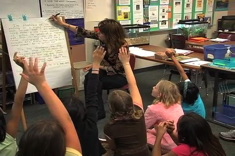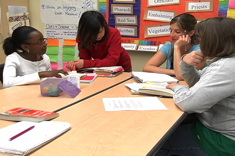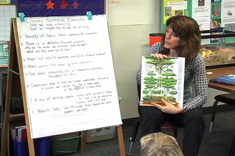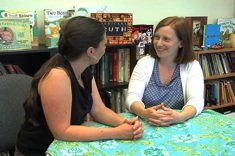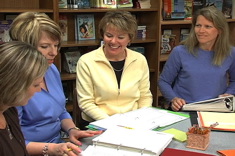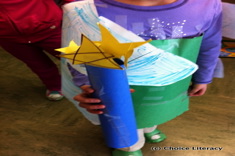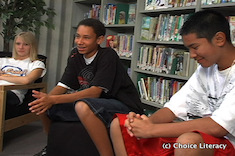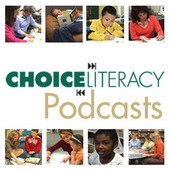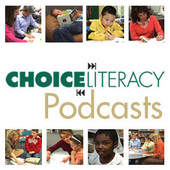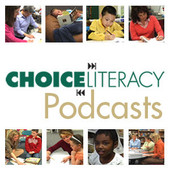Teaching Reading
Our contributors lead reading workshops in classrooms with creative flair. Over the past 12 years, we've filled our site with loads of suggestions, tools, and tips for using engaging books throughout the curriculum to hook kids on reading. Here is where you will find many stories of successful and not-so-successful workshop days, and what we learned from them. We bring these stories to life through hundreds of video examples.
Latest Content
Book Matchmaker: Texts for an Advanced First Grader
Joan is a first-grade teacher who has one reader in mind – a student who is reading well above grade-level expectations. Franki Sibberson has many intriguing book suggestions to help her.
Frogs as Learning Ambassadors Part 2: Literary Nonfiction in 4th Grade
Andrea Smith explains how the classroom environment influences instruction in the second installment of this video series.
Book Matchmaker: Intermediate Read-Alouds
Franki Sibberson shares some of her favorite read-alouds for the intermediate grades.
Why Read? – A Question to End the School Year
“Why read?” This is the question asked every spring in Erin Ocon’s middle school classroom, and in the process of answering it, she and her students rediscover a lot of what they’ve learned together throughout the year.
The Sponge Summary Lesson Part 1
In this sequence of videos, Heather teaches a fourth-grade class, using the analogy of a sponge to explain how summaries work. In this first video excerpt, Heather reviews the work the class has already done on understanding the attributes of good summaries.
Book Matchmaker: Graphic Novels for a 6th Grader
Franki Sibberson has graphic novel suggestions for 6th grade girls.
The Sponge Summary Lesson Part 2
In this sequence of videos, Heather teaches a fourth-grade class, using the analogy of a sponge to explain how summaries work. In this second video, Heather presents the powerful analogy of a sponge for summarizing.
Book Matchmaker: 5th Grade English Language Learners
Robin Heist is an elementary teacher looking for books for her older English language learners who are reading below grade-level expectations.
How Do We Structure Small Groups? (Part 3 of the Grouping Series)
Heather Rader synthesizes recommendations and provides examples of how grouping structures work in classrooms.
The Sponge Summary Lesson Part 3
In this sequence of videos, Heather teaches a 4th grade class, using the analogy of a sponge to explain how summaries work. In this third video, Heather and students cull down a text into the important points needed for a summary.
The Sponge Summary Lesson Part 4
In this sequence of videos, Heather Rader teaches a 4th grade class, using the analogy of a sponge to explain how summaries work. In this fourth video, Heather and students discuss their summaries in progress
Digging Into Literary Nonfiction
Andrea Smith and her 4th grade students use an article from National Geographic for Kids to chart literary nonfiction elements.
Perspective as a Component of Text Complexity: A Common Core Booklist
Franki Sibberson tackles the connections between text complexity and perspective in this Common Core booklist.
Common Core Conversations: Using Evidence From Text
Amanda Adrian and Heather Rader explain how the standard for finding evidence in texts might change instruction.
Mentor Texts for Nonfiction Writing
Beth Lawson and Heather Rader meet to plan and share mentor texts for nonfiction writing in Beth’s fourth-grade classroom.
The Art of Slow Reading: A Conversation with Tom Newkirk (PODCAST)
In this podcast Brenda Power talks with Tom Newkirk about what has been lost and what is truly meant by “slow reading.”
Working with Adults: Structuring Effective Conferring
Amanda Adrian connects new learning as a runner to her work with teachers around reading conferences, and shares a model that works.
Tuesday Trades: A New Literacy Ritual in My Classroom
Tuesday Trades are a terrific way to increase peer book recommendations. Andrea Smith created this new weekly activity with her intermediate students, building on existing workshop routines.
Readers’ Theater Revisited
Katie DiCesare becomes reacquainted with an old curricular friend. But in trying reader’s theater again in her primary classroom, she finds ways to streamline the process and foster more independence in students.
An ESL Poetry Cafe Celebration (Part II)
Stella Villalba explains how her Poetry Cafe program brings families together for a festive event, and helps English language learners develop reading and fluency skills at the same time. This is the second installment in a two-part series.
High School Students Take on a Reader’s Bill of Rights
Ellie Gilbert revisits the “rights of readers” with her high school students,revising the list based on their habits and preferences. The discussion leads to some surprising additions to the list of rights. This would be a fun activity to close out the school year, or to begin a summer program with children of almost any age.
Sharon Taberski on Book Choice (PODCAST)
Sharon Taberski talks about the teacher’s role in helping students make smart and thoughtful book choices.
Ways to Collaborate With Your School Librarian
Teachers and school librarians would often love to collaborate more, but time is limited. After working for years as both a classroom teacher and school librarian, Franki Sibberson writes from experience as she shares practical suggestions for collaborating with school librarians.
Book Matchmaker: Texts for 5th Grade English Language Learners
Finding high interest books for English language learners in the upper elementary grades can be a challenge. Franki Sibberson shares some of her favorites.
Tuesday Trading Post: Involving the Whole School in a Book Exchange
Here's a terrific idea for building the home/school reading connection and involving parent groups in literacy. Andrea Smith shares the nuts and bolts of the Tuesday Trading Post, a schoolwide book exchange.
Using Animated Short Films to Teach Inference
Here’s a problem many teachers share – students are far too literal when it comes to inferring while reading. Ellie Gilbert finds animated short films readily available on the web are a terrific tool for helping students move beyond literal interpretations of text.
Sharon Taberski on Comprehension Instruction (PODCAST)
In this podcast, Sharon Taberski chats with Franki Sibberson about comprehension instruction across the grades.
Lester Laminack on Reading Like a Writer (PODCAST)
In this podcast, Franki Sibberson chats with Lester Laminack about how he reads as a writer, and what teachers might do to develop this skill in their students. Lester is the author of beloved books for children and teachers, including Saturdays and Teacakes and Unwrapping the Read Aloud
.
Donalyn Miller on Engaging Readers (PODCAST)
In this podcast, Franki Sibberson chats with Donalyn Miller about how she defines “engaged” reading, and the teacher’s role in motivating readers.
Fireflies: Then and Now
Andrea Smith watches her young daughter capture fireflies in the twilight of a summer night. The evening reminds her of what’s changed in connecting literacy and life experiences, and what endures for teachers and kids.
Browse Content By
Type
Category
- Assessment Tools
- Big Fresh Archives
- Booklists
- Choice Numeracy
- Classroom Design
- Common Core
- Community Building
- Conferring
- Content Literacy
- Digital Literacy
- English Language Learners
- Equity
- Family Relations
- Free Samples
- Guiding Groups
- Leadership
- Literacy Coaches
- Mentor Texts
- Minilessons
- New Teacher Mentors
- Podcasts
- Poetry
- Quote Collections
- Reading Strategies
- Self Care
- Struggling and Striving Learners
- Talking and Listening
- Teacher Study Groups
- Teaching Reading
- Teaching Writing
- Word Study and Vocabulary
Author
- Melissa Quimby
- Nawal Qarooni
- Gwen Blumberg
- Julie Cox
- The Lead Learners
- Hannah Tills
- Josie Stewart
- Ruth Metcalfe
- Mallory Messenger
- Becca Burk
- Jodie Bailey
- Vivian Chen
- Mary Brower
- Tiffany Abbott Fuller
- Stephanie Affinito
- Ruth Ayres
- Leigh Anne Eck
- Heather Fisher
- Shari Frost
- Julie Johnson
- Suzy Kaback
- Gigi McAllister
- Shirl McPhillips
- Melanie Meehan
- Cathy Mere
- Debbie Miller
- Tara Barnett and Kate Mills
- Tammy Mulligan
- Dana Murphy
- Bitsy Parks
- David Pittman
- Brenda Power
- Heather Rader
- Matt Renwick
- Mandy Robek
- Christy Rush-Levine
- Gretchen Schroeder
- Jen Schwanke
- Brian Sepe
- Katherine Sokolowski
- Stella Villalba
- Jennifer Vincent
Grade Level
Choice Literacy Membership
Articles
Get full access to all Choice Literacy article content
Videos
Get full access to all Choice Literacy video content
Courses
Access Choice Literacy course curriculum and training


